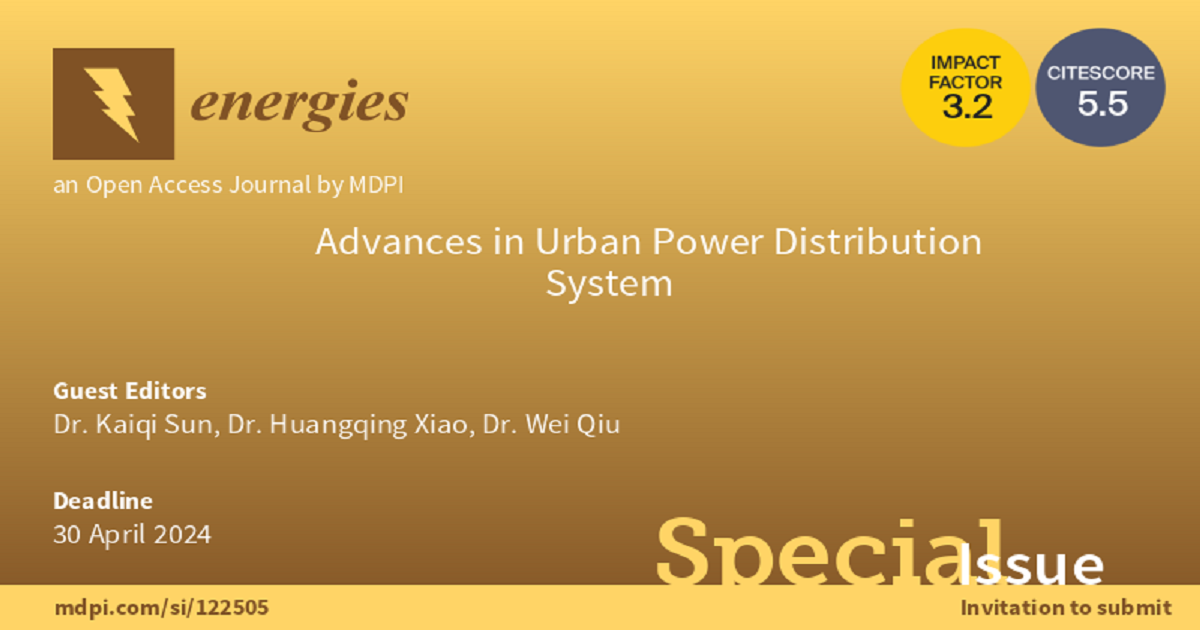Advances in Urban Power Distribution System
A special issue of Energies (ISSN 1996-1073). This special issue belongs to the section "F2: Distributed Energy System".
Deadline for manuscript submissions: closed (30 April 2024) | Viewed by 7304

Special Issue Editors
Interests: renewable energy integration; the application of HVDC and MVDC in the urban power grid; cyber security in voltage source-based converter control
Special Issues, Collections and Topics in MDPI journals
Interests: renewable power integration; DC transmission and distribution system; DC circuit breaker
Special Issue Information
Dear Colleagues,
The urban power distribution system is one of the most complex artificial systems in the world. Along with the process of urbanization in the past decade, the urban power distribution system faces many challenges in terms of expansion and operation. On the one hand, the growth rate of the power demand in the urban power distribution system has been remarkable in recent years. This is because of the continuous human migration from the countryside to the metropolis, while the average electric power consumption in the city has increased rapidly. However, on the other hand, traditional urban power generation has been replaced by town-style renewable generation or cleaner external sources to reduce greenhouse gas emissions. The unbalanced development of the generation side and load side significantly raises the probability and high impacts of power outages in the urban power distribution system. In order to maintain the sustainable development of the urban power grid, the new technologies and control strategy need to receive more attention.
This Special Issue aims to draw attention to research and review articles on the existing urban power distribution systems. The focus will be on promoting theoretical and practical studies in the control and operation of the urban power distribution system to help the application of advancing technologies and their related theory in the urban power distribution systems.
The topics of interest include but are not limited to the following:
1) Flexible operation of hybrid AC/DC urban power distribution systems.
2) Intelligent control for the reliable operation of inflexible urban power distribution systems.
3) Theory and method of a coordinated operation in urban power distribution systems with high proportional renewable energies, flexible loads, and energy storage.
4) Measurement and data-driven approaches to improve the operation quality of urban power distribution systems.
5) The application of medium- and low-voltage level DC technology in urban power distribution systems.
6) Coordination of renewable energies operation in urban power distribution systems.
Dr. Kaiqi Sun
Dr. Huangqing Xiao
Dr. Wei Qiu
Guest Editors
Manuscript Submission Information
Manuscripts should be submitted online at www.mdpi.com by registering and logging in to this website. Once you are registered, click here to go to the submission form. Manuscripts can be submitted until the deadline. All submissions that pass pre-check are peer-reviewed. Accepted papers will be published continuously in the journal (as soon as accepted) and will be listed together on the special issue website. Research articles, review articles as well as short communications are invited. For planned papers, a title and short abstract (about 100 words) can be sent to the Editorial Office for announcement on this website.
Submitted manuscripts should not have been published previously, nor be under consideration for publication elsewhere (except conference proceedings papers). All manuscripts are thoroughly refereed through a single-blind peer-review process. A guide for authors and other relevant information for submission of manuscripts is available on the Instructions for Authors page. Energies is an international peer-reviewed open access semimonthly journal published by MDPI.
Please visit the Instructions for Authors page before submitting a manuscript. The Article Processing Charge (APC) for publication in this open access journal is 2600 CHF (Swiss Francs). Submitted papers should be well formatted and use good English. Authors may use MDPI's English editing service prior to publication or during author revisions.
Keywords
- urban power distribution system
- medium-voltage direct current system
- renewable energy integration
- power quality
- power electronic devices application







